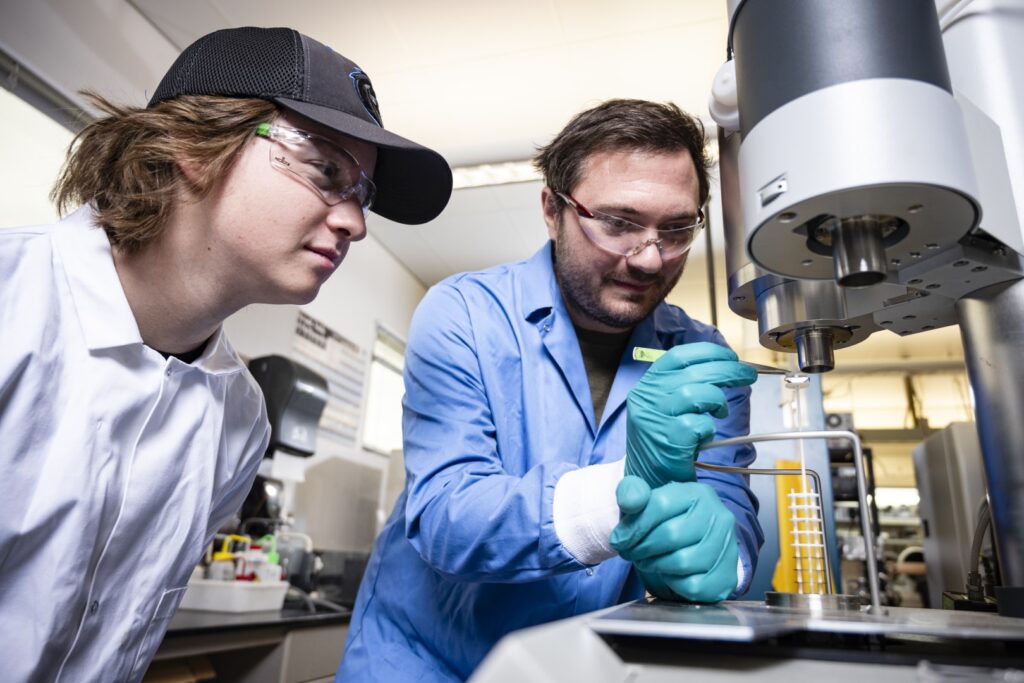The Interdisciplinary Doctorate of Philosophy (PhD) program in Materials Science & Engineering is a research-based degree program, culminating in a doctoral dissertation. All students accepted into the PhD Program are supported financially. Students take courses and conduct research year-round from start to completion of degree. The degree is estimated to take 4-6 years for a full-time student. Students entering with a masters degree often complete the degree in less time than those who enter direct from bachelors.

A minimum of 60 credits are required for the PhD program. MSE 601 will be taken during the first year a student is admitted to the MSE graduate program. All technical emphasis and elective course should be chosen in consultation with the advisor and program coordinator. The Required Core coursework will generally be completed within the first 18-24 months of study. Once all Required Core courses are successfully completed (i.e., each course with a B or better, and a combined GPA of 3.40), the comprehensive exam, MSE 691, can be taken. The comprehensive exam represents a significant milestone and assessment tool for monitoring how well information from various sources has been assimilated and integrated into a comprehensive knowledge of materials science and engineering. Students are expected to attend the MSE Seminar every semester, which provides an opportunity to enhance their knowledge in materials science and engineering and related fields.
Content on this page is provided as a quick reference for planning. All official course descriptions/degree requirements/admission standards/program learning outcomes/etc. are published on the Graduate Catalog site. Updated 7/8/2025.
Contact msegrad@boisestate.edu with any questions about the program curriculum.
Program Requirements
For detailed program requirements, please review the program handbook
Course Requirements
Other Requirements
Entrance Exam
All students in the Materials Science & Engineering Interdisciplinary Graduate Program are admitted provisionally and must pass the MSE Entrance Exam with an 80% or better within the first year of enrollment. The exam is designed to help ensure all MSE graduate students have an appropriate level of knowledge specific to materials science & engineering. Each student will receive more information about the exam prior to the first semester of enrollment
Proposal & Comprehensive Exam
The proposal and comprehensive exam are two separate requirements that are designed to be completed within the same semester. Typically a student will complete these between semesters four and six, after the core coursework is completed, and has progressed in research such that a first author manuscript is published or submitted. The proposal is a written document addressing the scope of work for the dissertation research and the comprehensive exam is the oral presentation of the proposal and a follow-up Q&A session.
Dissertation
A Ph.D. dissertation documents original research carried out by you while enrolled in the graduate program. This research is characterized by a clearly stated proposition or hypothesis that is investigated using analysis and synthesis of data or other scholarly evidence; it must include a discussion of the relevant literature and demonstrate your ability to independently and successfully address a significant intellectual problem with concepts and methods that are accepted in the major field of study.
Final Oral Exam
The preparation and public defense of a dissertation is the culminating activity of the program. The dissertation must be the result of independent and original research and must constitute a significant contribution to Materials Science and Engineering body of knowledge. The final oral examination (the defense) consists of three sequential parts: (i) a public presentation, (ii) a public question and answer session, and (iii) a private question and answer session with the student’s Supervisory Committee. The outcome of the final oral examination can only be pass or fail and is determined by a majority vote of the Supervisory Committee